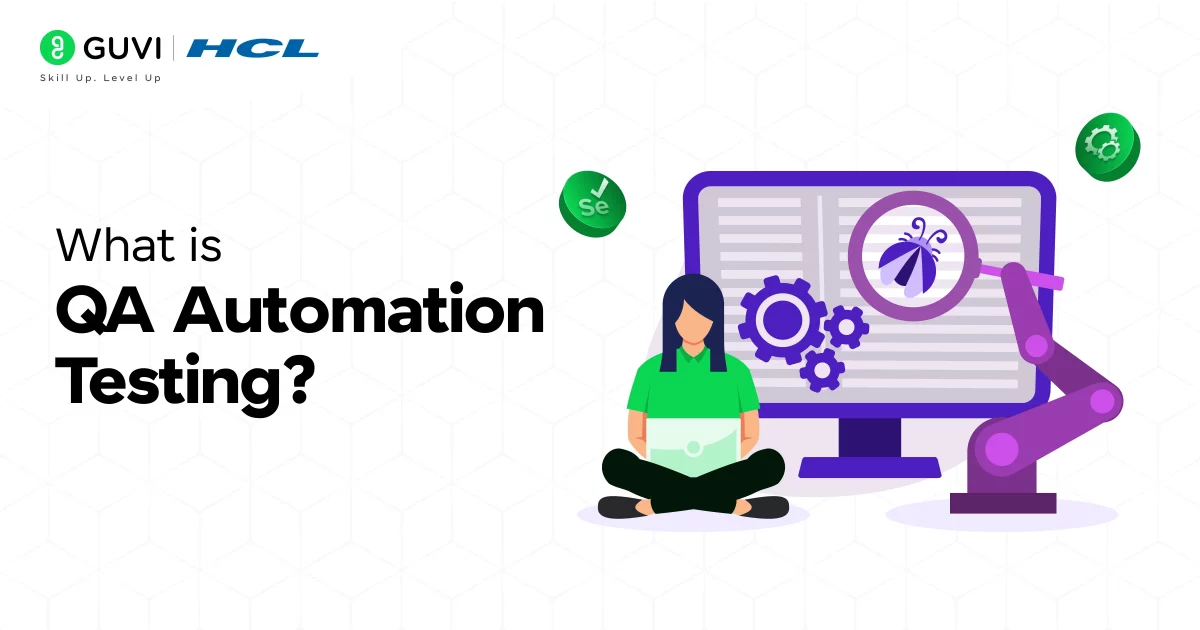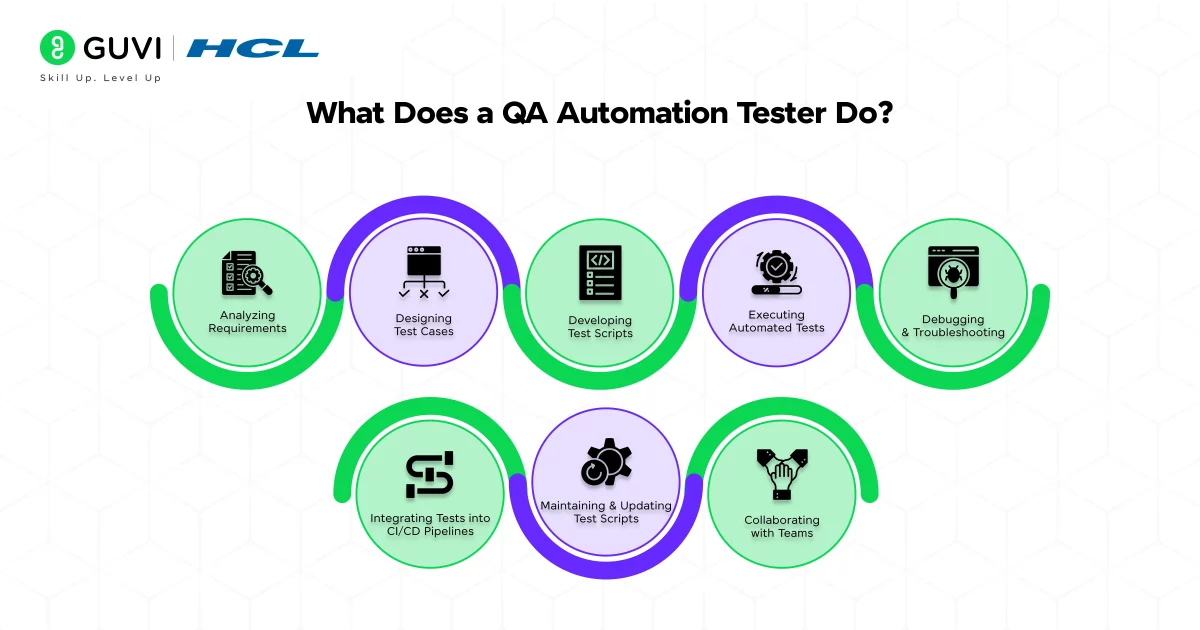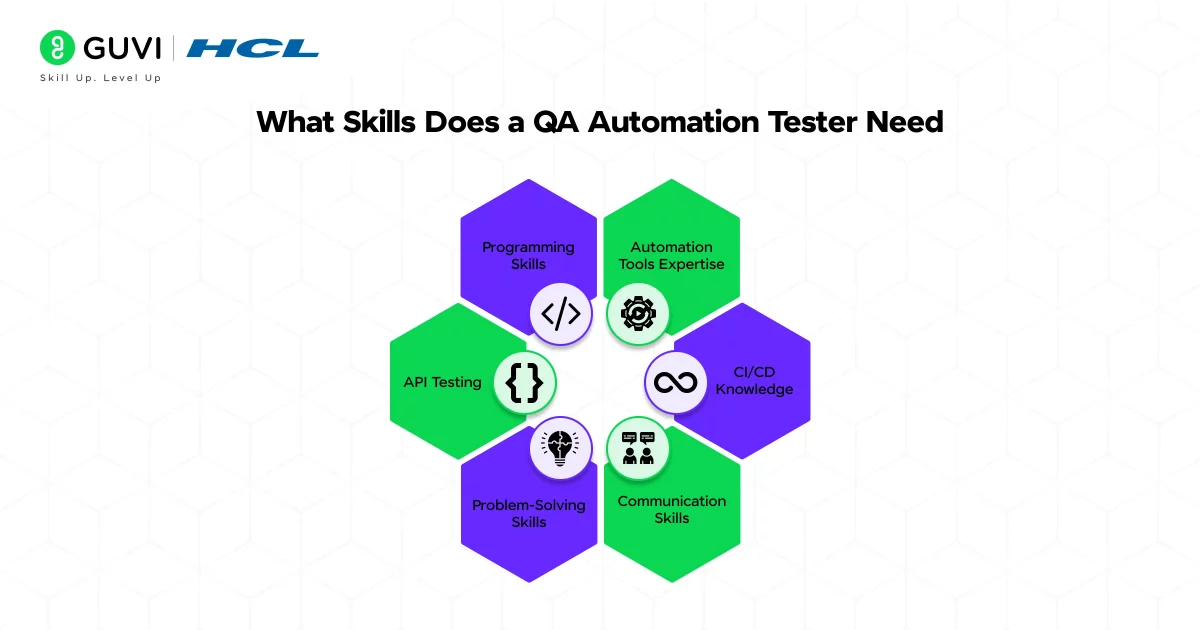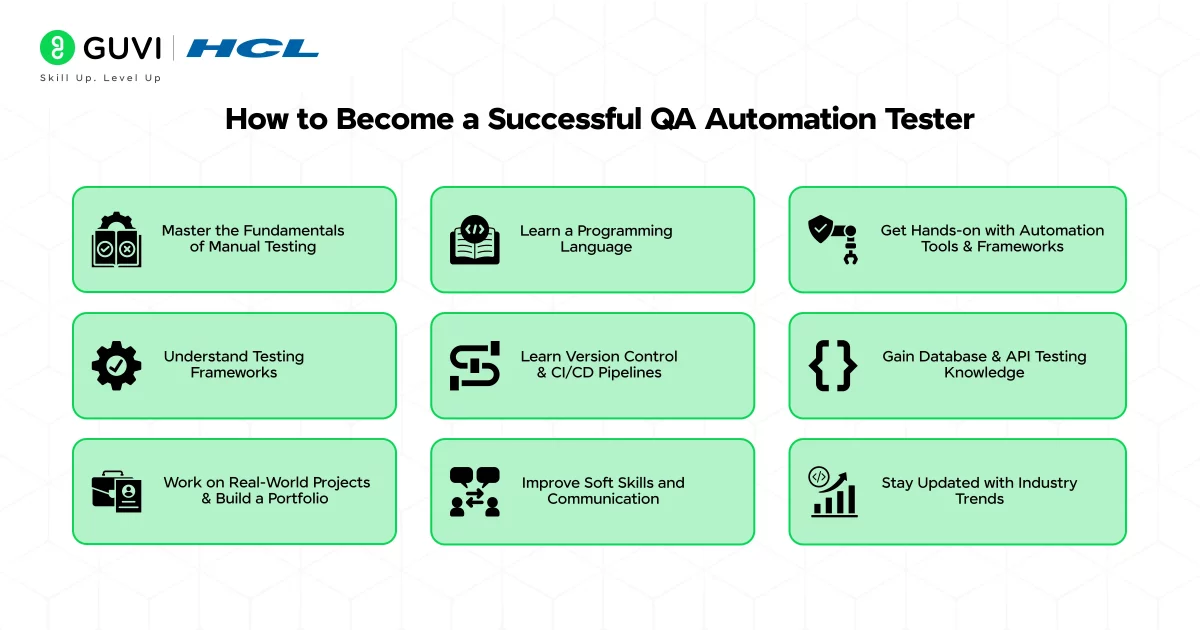
How to Become a Successful QA Automation Tester?
Mar 13, 2025 4 Min Read 5188 Views
(Last Updated)
It is not a secret that top tech companies have been transitioning from manual to automation testing rapidly in recent years.
Automation testers will ensure that the end product of the business meets all the client requirements and close the development loop. They automate basic and repetitive tasks to save lots of time, money, and effort for the employed company. So, it is a crucial and much sought-after role in the IT industry.
This blog spotlights the career path to becoming an automation tester, discovering the job role, describing the skills required, eligibility, hiring trends, the scope of the field, and more. So, without further ado, let us get started!
Table of contents
- What is QA Automation Testing?
- What Does a QA Automation Tester Do?
- Types of QA Automation Testing
- What Skills Does a QA Automation Tester Need?
- How to Become a Successful QA Automation Tester?
- Master the Fundamentals of Manual Testing
- Learn a Programming Language
- Get Hands-on with Automation Tools & Frameworks
- Understand Testing Frameworks
- Learn Version Control & CI/CD Pipelines
- Gain Database & API Testing Knowledge
- Work on Real-World Projects & Build a Portfolio
- Improve Soft Skills & Communication
- Stay Updated with Industry Trends
- Your Roadmap to Success
- Conclusion
- FAQs
- How do I become a QA automation engineer?
- Is QA a difficult job?
- Which automation course is best?
- Who is eligible for the Automation Testing course?
- Are QA automation testers in demand?
What is QA Automation Testing?

A QA Automation Tester (Quality Assurance Automation Tester) is a professional responsible for ensuring the quality and reliability of software applications through automated testing processes.
Instead of manually executing test cases, an automation tester writes scripts and uses tools to automate repetitive and complex testing tasks, making the testing process faster, more efficient, and more reliable.
What Does a QA Automation Tester Do?

A QA Automation Tester is responsible for:
- Analyzing Requirements – Understanding the software application and defining test objectives.
- Designing Test Cases – Writing test cases based on functional and non-functional requirements.
- Developing Test Scripts – Writing automated test scripts using tools like Selenium, Cypress, Appium, or JUnit.
- Executing Automated Tests – Running scripts and analyzing test results.
- Debugging and Troubleshooting – Identifying failures, reporting bugs, and working with developers to fix issues.
- Integrating Tests into CI/CD Pipelines – Ensuring tests run automatically during the software build process.
- Maintaining and Updating Test Scripts – Keeping scripts up-to-date with application changes.
- Collaborating with Teams – Working closely with developers, product managers, and manual testers.
Types of QA Automation Testing
A QA Automation Tester works with different types of testing, including:
- Functional Testing – Verifying if software functions as expected.
- Regression Testing – Ensuring that new changes do not break existing functionality.
- Performance Testing – Checking system responsiveness and load-handling capability.
- API Testing – Validating API responses using tools like Postman or RestAssured.
- UI Testing – Automating user interface (UI) interactions.
- Mobile Testing – Testing mobile applications using tools like Appium.
What Skills Does a QA Automation Tester Need?

To become a successful QA Automation Tester, you should develop:
- Programming Skills – Knowledge of languages like Java, Python, JavaScript, or C#.
- Automation Tools Expertise – Experience with Selenium, Cypress, TestNG, JUnit, etc.
- CI/CD Knowledge – Familiarity with Jenkins, Git, Docker, and Kubernetes.
- API Testing – Understanding of RESTful APIs and tools like Postman.
- Problem-Solving Skills – Ability to debug and fix test failures.
- Communication Skills – Clear documentation and collaboration with teams.
With the increasing demand for automation testing in the software industry, becoming a QA Automation Tester is a promising and rewarding career path.
How to Become a Successful QA Automation Tester?

The job responsibilities of an Automation Tester aren’t just limited to deducting errors while executing automation test scripts. It’s a lot more than that.
When you are an Automation Tester, you have to write test scripts, design automation tests, choose the appropriate test automation tool, perform software testing to deduct defects and produce a result report. Let us see how to become one!
1. Master the Fundamentals of Manual Testing
Before diving into automation, it’s crucial to have a solid understanding of manual testing. This helps you grasp fundamental testing concepts, including test cases, test scenarios, and defect management.
Why is manual testing important? Because even the best automation scripts won’t be useful if you don’t know what to test! Manual testing experience will provide a foundation for designing effective test automation strategies.
Where to Start?
- Learn Software Testing Life Cycle (STLC) and Software Development Life Cycle (SDLC)
- Understand different types of testing like functional, regression, unit, and integration testing
- Practice using bug-tracking tools like JIRA, Bugzilla, and TestRail
2. Learn a Programming Language
Since automation testing involves writing scripts, you’ll need to get comfortable with coding. The most popular programming languages for automation testing are:
- Java (most widely used with Selenium)
- Python (simple and beginner-friendly)
- JavaScript (popular for web-based automation)
- C# (used in .NET environments)
Choose one language and become proficient in it. You don’t need to be a software developer, but you should be able to write, debug, and maintain test scripts.
Pro Tip:
Start with basic programming concepts like variables, loops, functions, and object-oriented programming (OOP) before jumping into automation frameworks.
3. Get Hands-on with Automation Tools & Frameworks
Once you’re comfortable with programming, the next step is to learn automation tools. The choice of tool depends on the type of application you’re testing:
Popular Automation Testing Tools:
- Selenium (Best for web applications)
- Appium (For mobile app testing)
- TestNG & JUnit (Frameworks for Java-based testing)
- Cypress & Playwright (Modern alternatives for web automation)
- Postman & RestAssured (For API testing)
Learning these tools will help you automate repetitive test cases, improve efficiency, and become a valuable asset in your team.
4. Understand Testing Frameworks
Automation frameworks provide a structured way to write and execute test scripts. They help organize test cases, generate reports, and integrate with Continuous Integration/Continuous Deployment (CI/CD) pipelines.
Some commonly used testing frameworks include:
- Data-driven framework (Uses external data sources like Excel, CSV, or databases)
- Keyword-driven framework (Uses keywords for test actions)
- Hybrid framework (Combination of both)
- Behavior-Driven Development (BDD) (Uses tools like Cucumber and SpecFlow for a human-readable format)
Understanding these frameworks will make your automation scripts more scalable, maintainable, and efficient.
5. Learn Version Control & CI/CD Pipelines
Modern software teams work with DevOps practices, so knowing CI/CD pipelines is a big plus. These pipelines help automate test execution as part of the software deployment process.
Key Skills to Develop:
- Git & GitHub/GitLab – For version control
- Jenkins, CircleCI, or Azure DevOps – For Continuous Integration (CI)
- Docker & Kubernetes – For test environment management
Familiarity with these tools will make your automation workflow smoother and more aligned with industry practices.
6. Gain Database & API Testing Knowledge
Automation testing isn’t just about UI testing. You should also understand backend testing using:
- SQL & Databases – Learn how to write basic SQL queries to verify data
- API Testing – Use Postman, RestAssured, or SoapUI to test APIs
- Performance Testing – Tools like JMeter can help simulate user load on applications
Having backend testing skills will set you apart from other testers.
7. Work on Real-World Projects & Build a Portfolio
Theory is important, but hands-on experience is what really counts. Start by working on real-world Automation Testing projects and building a portfolio that showcases your automation skills.
Ways to Gain Practical Experience:
- Contribute to open-source projects on GitHub
- Automate test cases for a personal project or a dummy website
- Apply for internships or freelance testing gigs
- Document your projects and showcase them on LinkedIn or a personal blog
A strong portfolio will significantly boost your job prospects.
8. Improve Soft Skills & Communication
Technical skills alone won’t make you a great automation tester. You also need strong communication and problem-solving skills.
Why Do Soft Skills Matter?
- You’ll need to communicate bugs effectively with developers
- Writing clear test documentation is essential
- You’ll work in cross-functional teams, so collaboration is key
Improving these skills will help you advance in your career.
9. Stay Updated with Industry Trends
QA automation is constantly evolving. Staying updated with the latest tools and trends will keep you ahead of the competition.
How to Stay Updated?
- Follow blogs like Ministry of Testing, TestGuild, and LambdaTest
- Join testing communities on LinkedIn, Slack, and Discord
- Attend QA conferences and webinars
- Take online courses on Udemy, Coursera, or Pluralsight
Being proactive in learning will help you stay competitive in the job market.
Your Roadmap to Success
Becoming a QA Automation Tester requires a mix of technical knowledge, hands-on experience, and continuous learning. Start with manual testing, learn automation tools, practice scripting, and build real-world projects.
Here’s a quick roadmap to get started:
- Learn manual testing concepts
- Pick a programming language (Java, Python, etc.)
- Master automation tools like Selenium, Appium, and Postman
- Understand testing frameworks and CI/CD pipelines
- Gain backend knowledge with API and database testing
- Work on real-world projects and build a portfolio
- Stay updated with industry trends and join testing communities
The field of QA automation is growing rapidly, and with the right skills and mindset, you can build a successful career in it.
In case you want to learn more about software testing with the help of Selenium, consider enrolling for GUVI’s Automation Testing with Selenium course that teaches you everything from scratch and provides you with an industry-grade certificate!
Conclusion
All the points discussed in the blog would have helped you understand what it takes to become a successful QA Automation Tester. You can create a customized learning path for your automation testing career.
Automation testing is an evergreen field and will continue to bloom along with the constant growth of the software industry. With the expertise of automation tools, you can choose this career path with the utmost confidence.
Your practices and perseverance will undoubtedly translate into a rewarding career in Automation Testing.
FAQs
To become a QA Automation Engineer, learn the working of popular automation testing tools, develop your creative thinking ability, understand the underlying principles of Automation testing, and keep yourself updated with the latest technologies in the field of testing.
QA Automation Testing isn’t a difficult job. Skills such as analytical skills, problem-solving skills, reporting skills, and communication skills are essential to perform your tasks as a successful QA Automation Tester
Online courses for Automation testing are very high in numbers throughout the web. Everyone has a unique set of learning needs. So, choose the right course that best fits all your needs.
Students or professionals (especially software developers) with a technical background can sign up for the automation testing course.
Companies highly rely on Automation testing for product releases and updates. So, the demand for Automation Testers is always high as they ensure reliability and reduce the time-to-market of the product.

























![Top 10 Mistakes to Avoid in Your Data Science Career [2025] 10 data science](https://www.guvi.in/blog/wp-content/uploads/2023/05/Beginner-mistakes-in-data-science-career.webp)



![Top React Interview Questions and Answers! [Updated] 14 React Interview Questions](https://www.guvi.in/blog/wp-content/uploads/2022/01/Top-React-Interview-Questions-and-Answers.webp)

Did you enjoy this article?